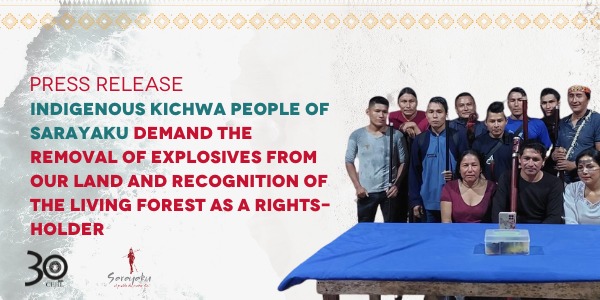






The indigenous community denounced serious non-compliance with the Inter-American Human Rights Court’s ruling after 10 years.
Quito, June 10, 2022. In a hearing before the Constitutional Court of Ecuador, the Kichwa people of Sarayaku, through their representatives the Center for Justice and International Law (CEJIL) and lawyer Mario Melo, requested the Ecuadorian State to urgently comply with the orders of the Inter-American Court of Human Rights (I/A Court), which have been not been complied with since the issuance of the judgment in their favor 2012.
The explosives left 20 years ago by the CGC oil company in the sacred territory of Sarayaku continue to seriously threaten the survival of what the people know as Kawsak Sacha – the living forest – and threaten the life and personal integrity of the members of the Sarayaku community. Since the Inter-American judgment was issued in 2012, the State has not removed or deactivated even one kilogram of the more than 1,400 kg of explosives present in the territory. At the hearing it was evident that the State currently has no plan to comply with this order, nor to ensure Sarayaku’s participation and consultation on it.
The State’s failure to comply with this I/A Court order over the past 10 years has caused additional harm to the people and kawsak sacha. In June 2018, Sarayaku declared through a public statement that its territory, kawsak sacha, is a living being with consciousness, constituted by all the beings of the forest, from the most infinitesimal to the greatest and supreme. Thus, they requested as reparation that the Constitutional Court recognize kawsak sacha as a subject of rights, as already recognized by the Ecuadorian Constitution.
The representatives also expressed that the State has failed to comply with the orders of the I/A Court, as the Sarayaku community has not been consulted regarding the numerous oil exploration activities and concessions that affect their territory, nor has a law on free, prior, and informed consultation been adopted. They also stated that the State’s inaction has generated a set of additional impacts to the detriment of the people and the Kawsak Sacha, which have a severe impact on the people of Sarayaku, the rule of law, international protection, the rights of indigenous peoples and the protection of the rights of nature in the context of the climate emergency.
Viviana Krsticevic, director of CEJIL, emphasized the non-compliance and urged the Constitutional Court to open the term for evidence-gathering so that through an in-person visit to the Sarayaku territory, it can verify the nature of the ongoing violations claimed by the people in this lawsuit and the relevance of the proposed reparation measures. “We understand that the Constitutional Court of Ecuador has much to contribute to legal development and national and international protection. It can guarantee compliance with the Inter-American Court’s ruling and order reparations that take into account the additional damage generated by its non-compliance, considering the subsistence of the violations for a decade,” he said.
At the close of the hearing, Sarayaku leader José Gualinga reinforced in a quick intervention what was expressed by his representatives and clarified: “the persistence of the 1400 kg of explosives are a threat that threatens food sovereignty because they create an energy boundary that prevents us from using much of the territory, which is why we reiterate the need for a visit to the territory to verify the damage”.